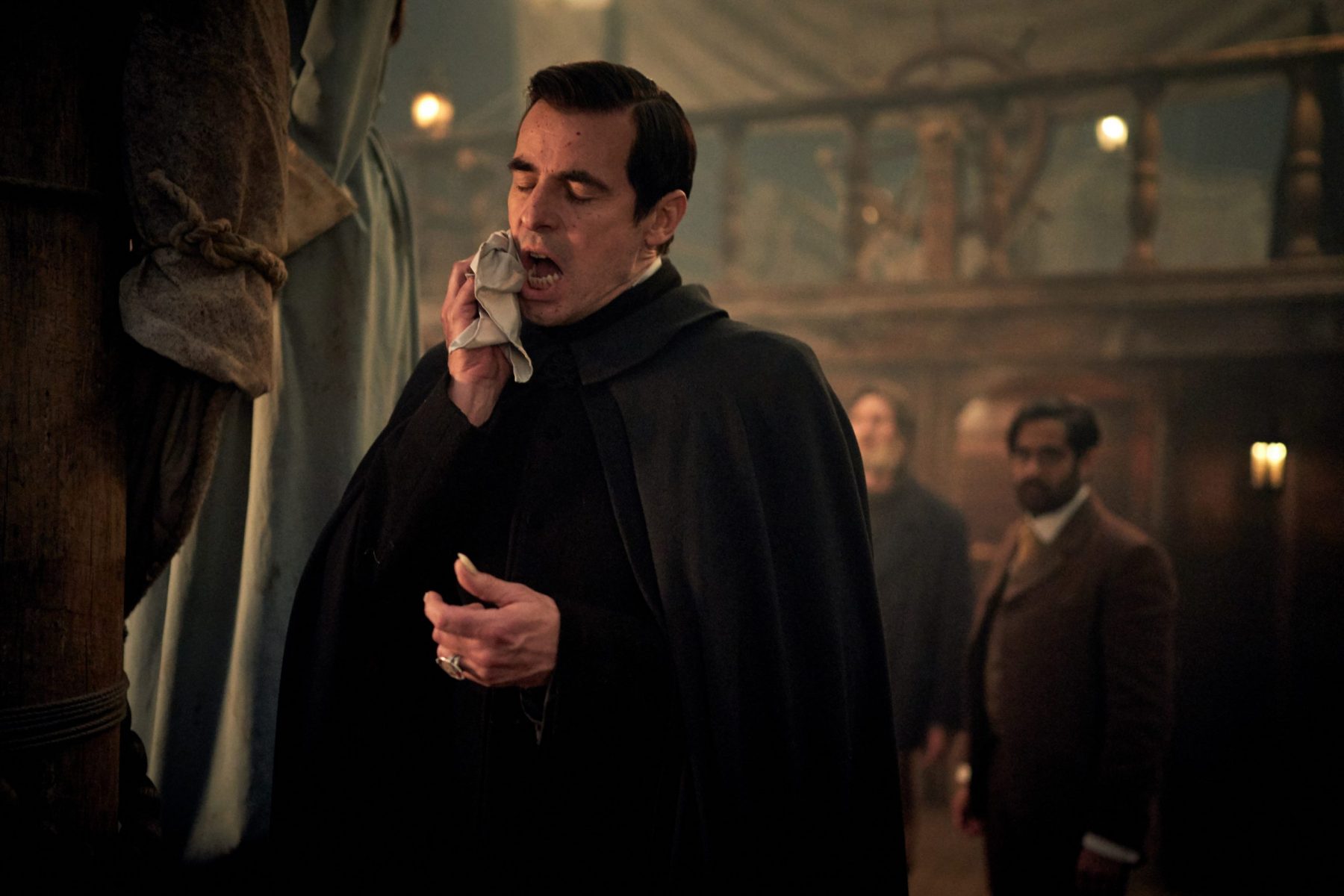The beginning of BBC’s “Dracula” series, which is now available to watch on Netflix in the states, is a salvo of disorienting tactics. It begins with a disillusioned nun capping off an interview with Jonathan Harker, the protagonist of Bram Stoker’s novel, with a blunt question about his sexual history with the Count. The opening challenges everything we should expect about the series, and it wraps all this discomfort around the knowing character work of the nun asking the questions. The opening segment’s assertive statement of adaptive departure is initially engrossing but ultimately misleading. The series’s ideas, different as they may be, almost never feel like wholly committed changes, as the deviations rarely feel like part of a cohesive or meaningful take on the material.
The proposed sexuality of Dracula is emblematic of the series as a whole: a stated idea rather than an expressed one. Much of the sexuality in the series is kept at arms’ length, as it is frequently laughed off with a puerile rejoinder. The implications behind Dracula’s sex with Harker are largely unexplored, and the idea of Dracula’s sexuality is never treated with any sense of eroticism or seduction.
The last episodes attempt to turn this on its head with a hastily-established gesture, but it, like so many other threads, feels completely unearned. By making its titular character into a steady stream of quips, “Dracula” turned its lead player into a monster marked by empty vacuousness rather than a lack of humanity; Dracula doesn’t possess any palpable sense of vulnerable humanity, which makes him feel incapable of indulging in anything — much less sex.
Dracula’s blankness is best expressed in the odd choice to make him a permanently smug, jokey presence. The opening episode of the series retells Harker and Dracula’s meeting in Transylvania, and the audience’s familiarity of the setup is frequently used as a punchline. The early meetings between the two come across like a bad comedy sketch robbed of its laugh track.
A sardonic Dracula is not a problem in itself, but the nearly unvarying tone of the character makes his jokes on the characters’ lack of knowledge particularly trying. The smugness is not a quirk that makes up a multifaceted Dracula — he is just a husk for the delivery of knowing nudges.
The constant signaling to the audience’s understanding of Dracula’s sinister efforts quickly reflects the series’s tendency to use its adaptive divergences as the last measures to escape the ostensible tedium of the “Dracula” story. This winking acknowledgement to the audience reaches its nadir in a line mocking the interpretation of Dracula as an embodiment of the xenophobia and sexual repression of 19th century England; a filmed ballet version of “Dracula,” “Dracula: Pages From a Virgin’s Diary,” uses this common critique of the text to approach the material in a distinct and substantial way. If the series was mocking the idea of an ostensibly neat critique, it fails by providing nothing meaningful in its messiness. Without any tangible sense of purpose, the self-congratulatory subversions of the new “Dracula” feel weightless and embarrassing.
The subversive ideas are plentiful; however, the series doesn’t give the appropriate amount of consideration to any of them. The idea that Dracula refusing to remain in his box for the journey to England is an auspicious way of going against the source material, but the execution makes the idea feel pointless. Despite feeling too close to both the crew and Dracula, we lack perspective on how the situation is really affecting anyone. The concepts in “Dracula” might suggest great things, but they fail to work off the proposed potential.
Though the series may have issues, the cast does an admirable job in making the material more than it is on paper. The performances, especially those of its two leads, play a large part in selling the characterizations. Playing the part of Sister Agatha, Dolly Wells gives the character a believable resourcefulness through succinct gestures, and her comic delivery makes even the offhand jokes land hard.
The show’s greatest moments are all signaled by her presence in the scene. Claes Bang’s Dracula is often trapped in the one-note characterization, but his physical presence does much more to sell the character than anything in the script. His movements are possessed by the perversity and glamour that Dracula is never really allowed to display in the plot or dialogue.
The show is also let down by its visual approach. Aside from some stylized flourishes in the final episode, the series does so little to visually mythologize Dracula. Most of the series focuses on dull coverage and purposeless movement that give off the impression of a visual approach trying to keep itself busy while the lines are delivered. The most suspenseful moments of the plot are undermined by cramped coverage and awkward low angles.
The relationship between Agatha and Dracula is by far the strongest part of the show; their shared scenes are palpably tense and entertaining battles of the mind. Unfortunately, the show frequently dilutes the relationship by placing so much importance on tertiary characters. The arcs of the episode-specific characters manage to take up both too much and not enough time.
The characters’ developments and denouements add so little to the story’s one semi-consistent through line, yet their lives are given as much gravity as those of Dracula and Agatha. The most egregious example is the character of Lucy, whose final moments in the series are presented with shrill swipes at tragedy and a bluntly asserted insight into Dracula’s true nature. The shallow connection between Lucy’s social media obsessed emptiness and Dracula’s life as a vampire is the series’s worst attempt at making its small ideas feel like grand insights.
The hardest part of criticizing the series is looking at how the series could’ve been a fun, thrilling take on the subject matter. The series struggles to find a way to develop any of its potentially compelling ideas. For a series so willing to crack jokes, “Dracula” never feels loose or comfortable in its own skin. Every new idea feels like a pointed effort to keep the series afloat, but they never congeal into any sort of coherent theme or mood. The series’s most convincing moments are when it positions Dracula as this snarling beast trying to dismember a momentarily protected human cast, but “Dracula” doesn’t commit to wanting to be anything. As the ending moments sloppily characterize Dracula as a man too afraid to realize his own ambitions, the series feels like it is speaking on its own failings.
















